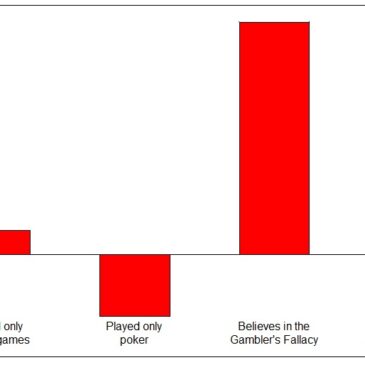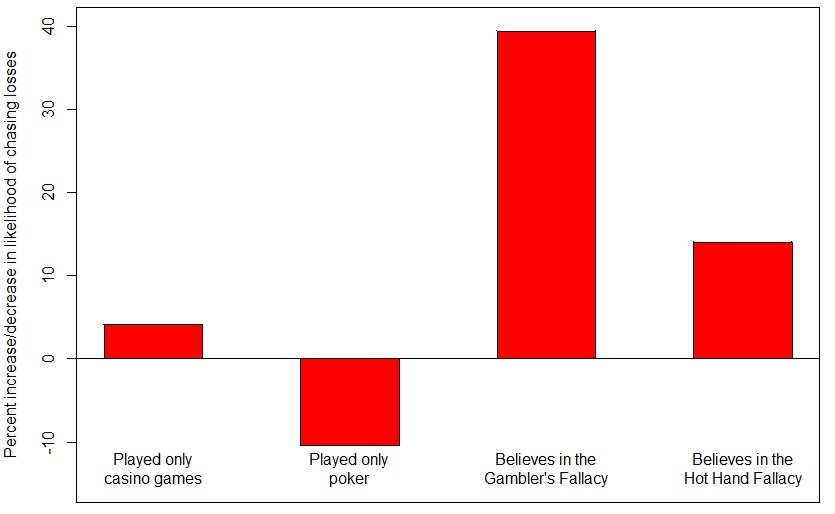“We play because poker is not a scratch-off ticket, a half-court jumper, or a knock on wood. It’s no game of luck, poker.” These lines provided the opening of a commercial for a once-famous online poker service—and ad designed to appeal to poker players who feel superior to other gamblers because, they believe, they rely on skill rather than irrational beliefs and behaviors. One irrational behavior associated with gambling disorder is “chasing losses” – placing bets in an attempt to win back money lost in previous bets. This week, The WAGER reviews a study that explores chasing losses and its potential predictors—including game preference (Gainsbury et al., 2014).
Methods
- To find online gamblers and poker players to complete their survey, the researchers placed recruitment advertisements on over 100 Internet casino and online poker websites. They collected data on 10,838 participants between August 2006 and December 2006.
- The researchers collected information about age, gender, occupation, and country of residence. They asked respondents to indicate the type(s) of online gambling in which they regularly participated.
- The researchers measured the tendency to chase losses by asking, “If you lose when gambling online, are you more likely or less likely to keep playing to try and win some money back?”
- The researchers also measured respondents’ belief in the Hot Hand Fallacy (i.e., ‘If had a recent run of winning bets, I would continue betting knowing that I am having a lucky streak and will probably continue winning”) and the Gambler’s Fallacy (i.e., ‘If had a recent run of losing bets, I would continue betting knowing that I am due some wins soon”).
- The researchers used a regression model to determine which measured factors were associated with reporting a tendency to chase losses.
Results
- Less than one-third of respondents (29%) reported having a tendency to chase losses.
- Factors that increased the likelihood of admitting to chasing losses included being female, being relatively young, being unemployed or in school, playing only online casino games, believing in the Hot Hand fallacy, and believing in the Gambler’s Fallacy. (Figure).
- Playing only online poker lowered the probability of chasing losses by 10.4% (Figure).
Figure. Association between respondents’ characteristics and probability of chasing losses, after controlling for demographics. Hot Hand and Gambler’s Fallacy associations are after controlling for game preferences. Adapted from Gainsbury et al., 2014. Click image to enlarge.
Limitations
- The data are from 2006, and in the intervening years, in many jurisdictions, the availability, variety, and legality of online gambling has changed. As such, the population of online gamblers has likely changed in ways that might affect these patterns.
- The respondents all volunteered to complete the survey, and their responses were self-reported. The respondents are not likely to be representative of the population of online gamblers, and their responses might have been biased by the respondents’ self-perceptions, self-presentation concerns, and faulty memory.
- The respondents did not report how much they had spent chasing losses, only that they tended to chase losses.
Conclusion
In this study, the authors observed that other factors being equal, gamblers who played online poker but did not play in online casinos were less likely to chase losses. With respect to this specific behavior, the group that could be interpreted as “poker purists” or “poker specialists” was different. One reason for this might be that several poker books, instructional videos, and podcasts warn players against the dangers of irrationally chasing losses (e.g., Tendler and Carter, 2011). From a clinical perspective, because chasing losses is less likely among poker players, it might be an especially valid indicator of loss of control. If so, then this might be a case where a clinician with more familiarity with the culture of the game can make a more informed diagnosis. It is true that clinicians should be careful not to over-generalize clients based solely on game selection. However, they should also be open to opportunities to utilize aspects of these cultures to help their clients correct their misconceptions and habits.
– Matthew Tom
What do you think? Please use the comment link below to provide feedback on this article.
References
Tendler, J. (2011). The Mental Game of Poker: Proven Strategies for Improving Tilt Control, Confidence, Motivation, Coping with Variance, and More. New York, NY: J. Tendler.





